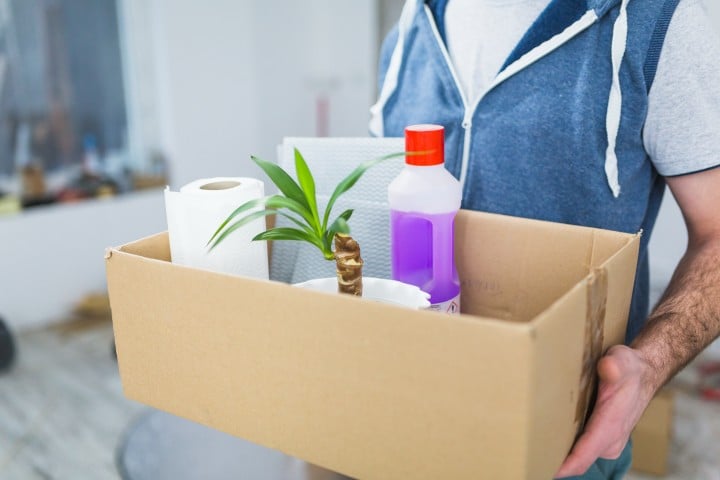Moving can have a significant environmental impact with all the boxes, bubble wrap, and transport involved. But with a few thoughtful changes, you can reduce waste and make your move more eco-friendly. Whether you’re relocating across town or to a different state, here are seven eco-friendly moving tips to help make your transition greener and kinder to the planet.

1. Declutter Responsibly
Before packing, take the time to declutter responsibly. Moving fewer items saves on moving costs, reduces the number of boxes you need, and ultimately cuts down on the fuel used in transporting your belongings. Plus, it’s an excellent way to avoid filling your new space with items you no longer need.
Eco-Friendly Decluttering Tips:
- Donate Usable Items: Donate gently used clothes, furniture, and household items to local charities, thrift stores, or shelters.
- Sell Unwanted Belongings: Host a garage sale or use online marketplaces like Craigslist, Facebook Marketplace, or eBay to sell items you no longer need.
- Recycle Responsibly: For items that are unusable, recycle wherever possible. Many communities have recycling centers for electronics, plastic, and other materials.
2. Use Eco-Friendly Packing Materials
Traditional packing materials like bubble wrap, plastic peanuts, and Styrofoam can be wasteful and harmful to the environment. Instead, look for greener options that provide the same level of protection without the environmental impact.
Eco-Friendly Packing Tips:
- Use Reusable Containers: Borrow or rent plastic bins for your move. Many moving companies offer reusable containers that can be picked up and returned after your move.
- Pack with Recyclable Materials: If you need extra padding, consider using recyclable packing paper or biodegradable bubble wrap made from recycled materials.
- Repurpose What You Already Have: Towels, blankets, and clothing can be used to cushion fragile items, reducing the need for extra packing materials.
3. Find Used Moving Boxes or Rent Reusable Ones
are a staple for moving, but they can pile up quickly, creating significant waste. Instead of purchasing new boxes, look for used ones or rent reusable plastic bins to minimize your environmental impact.
Box Tips:
- Source Free or Used Boxes: Many grocery stores, liquor stores, and online community boards (like Freecycle) offer free, gently-used boxes. These boxes are typically sturdy enough for moving and reduce waste.
- Rent Plastic Moving Bins: Several companies specialize in renting out sturdy, stackable plastic bins that you can use for moving and then return, eliminating the need for cardboard altogether.
- Recycle Your Boxes After the Move: If you do end up using cardboard boxes, be sure to recycle or donate them after your move. Many recycling centers accept cardboard, or you can pass them along to friends or family.
4. Use Eco-Friendly Moving Supplies
When you’re preparing for a move, you’ll need tape, markers, and labels. Choose eco-friendly versions of these supplies to cut down on plastic waste and keep your move as green as possible.
Eco-Friendly Supplies Tips:
- Choose Biodegradable or Recyclable Tape: Look for paper-based packing tape that can be recycled along with your boxes. It’s just as strong as plastic tape but much more eco-friendly.
- Opt for Recycled Labels and Markers: Use recycled labels or reusable chalk markers that can be erased for multiple uses. They’re perfect for labeling reusable bins.
- Repurpose Household Items: Instead of buying new labels, use masking tape or scrap paper you already have around the house.
5. Opt for a Fuel-Efficient Moving Truck
Moving trucks can be gas guzzlers, and fuel is one of the biggest environmental costs associated with moving. If you’re renting a truck or hiring a moving company, look for eco-friendly options to minimize the impact of your move.
Transportation Tips:
- Choose the Right Size Vehicle: Make sure you’re renting a truck that’s the right size for your belongings. A larger truck uses more fuel, so choose one that’s neither too small nor unnecessarily large for your needs.
- Consider Eco-Friendly Moving Companies: Some moving companies offer hybrid or fuel-efficient vehicles as part of their fleet. Do a bit of research to find a green moving company that uses biodiesel or alternative fuel sources.
- Plan Efficient Routes: When driving to your new location, plan your route to avoid high-traffic areas, reducing idle time and overall fuel consumption.
6. Pack an Essentials Bag to Avoid Single-Use Items
Moving day can be hectic, and it’s easy to fall into the convenience of disposable items for meals and other essentials. By planning ahead, you can pack a bag with everything you’ll need, cutting down on single-use items.
Essentials Bag Tips:
- Pack Reusable Water Bottles and Utensils: Bring along a reusable water bottle and utensils so you won’t need to rely on plastic alternatives during your move.
- Bring Snacks in Reusable Containers: Instead of buying pre-packaged snacks, pack your own in reusable containers to reduce waste.
- Plan for Meals Without Takeout Waste: If possible, make meals ahead of time that you can easily heat up. Use reusable dishes and cutlery instead of disposable ones to cut down on waste.
7. Recycle and Dispose of Unwanted Items Properly
Even with careful planning, you may have items you need to dispose of. Electronic waste, batteries, hazardous materials, and chemicals can harm the environment if not handled correctly. Be mindful of how you discard these items before your move.
Recycling and Disposal Tips:
- Take Electronics to an E-Waste Recycling Center: Many local e-waste recycling centers will accept old electronics, which can contain hazardous materials.
- Dispose of Batteries Safely: Used batteries contain harmful chemicals and should never be thrown in the trash. Find local recycling options for batteries, as many electronics stores have drop-off points.
- Properly Dispose of Paint, Chemicals, and Hazardous Waste: Check with your city’s waste management department for instructions on disposing of hazardous materials.
Conclusion
Moving is inherently a time of change, and it’s the perfect opportunity to embrace eco-friendly practices. By decluttering responsibly, choosing sustainable packing materials, and making environmentally conscious decisions every step of the way, you can reduce the environmental impact of your move and make a positive difference. These eco-friendly moving tips not only help the planet but also create a cleaner, greener start in your new home. Happy green moving!
We hope you found this blog post 7 Eco-Friendly Moving Tips to Make Your Move Greener, useful. Be sure to check out our post Green Moving Tips – Eco-Friendly Moving Guide for more great tips!
Have Experience in the Moving Industry? Want an Additional Income Stream? Work With All Around Moving!
All Around Moving’s Work With Us program provides experienced moving consultants with the opportunity to run their own Relocation Consultant business from anywhere in the USA. We provide licensing, dedicated phone lines and email hosting, moving software for lead tracking, invoicing, and complete set up. There are no recurring expenses, except purchasing your own leads. We share profits 50-50 with you from all jobs you book with us. Click here to learn more.





